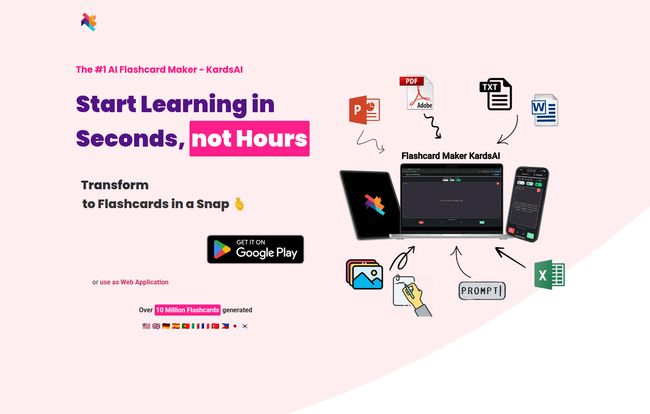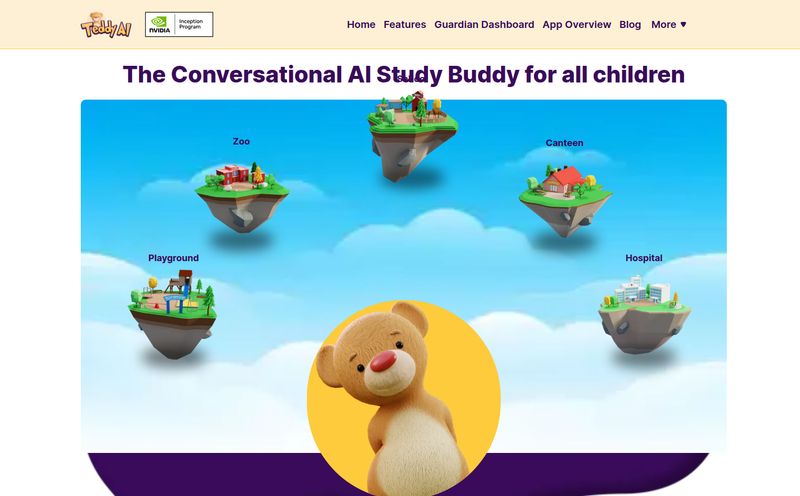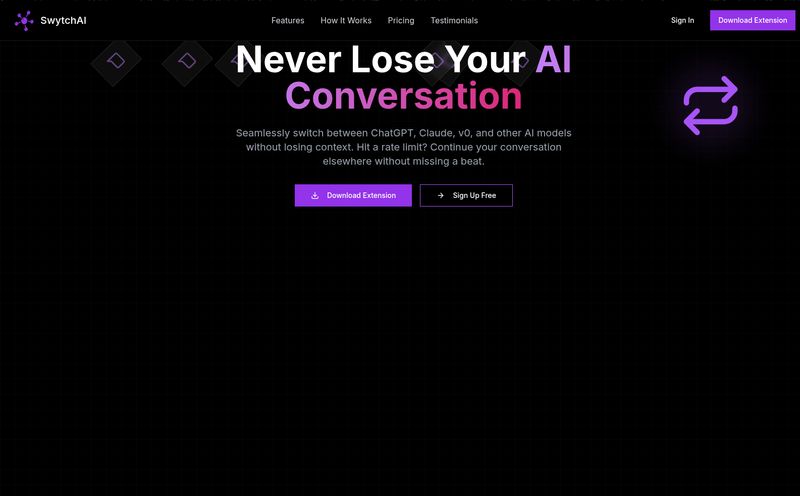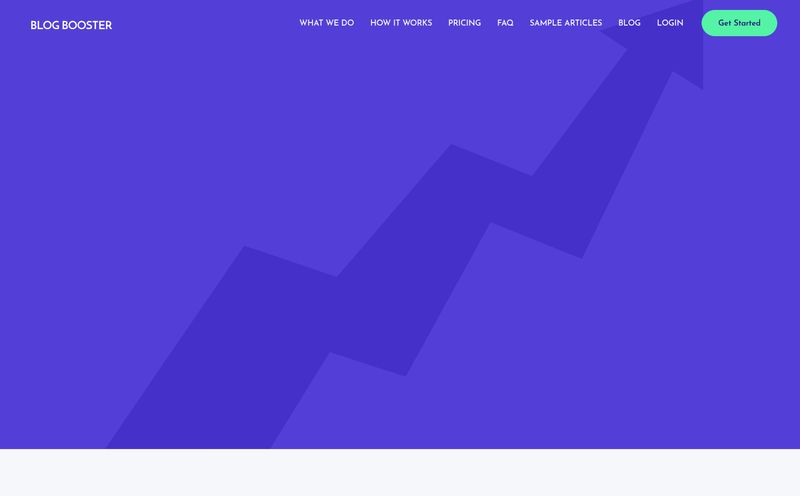Remember those late nights in college? The ones fueled by lukewarm coffee, the looming dread of an 8 AM final, and a mountain of textbooks you swore you’d read weeks ago. My desk was always a warzone of highlighters, sticky notes, and the worst culprit of all: a giant stack of blank index cards. The hand cramps were real, folks. The sheer tedium of writing out hundreds of flashcards was enough to make you question all your life choices.
For years, that was just the price of admission for serious learning. You put in the grunt work. But we're living in a different age now. I’ve been in the digital marketing and SEO world long enough to see AI shift from a sci-fi concept to a daily tool, and I'm always on the lookout for tech that actually solves a problem, not just creates a new one. So when I stumbled upon KardsAI, a tool that claims to be an AI-powered flashcard maker, my interest was definitely piqued. Could this be the end of the dreaded index card pile? I had to find out.
So What’s the Big Deal with KardsAI Anyway?
At its core, KardsAI is a flashcard application, but that's like calling a Tesla a 'horseless carriage'. The key difference is the AI engine humming under the hood. Instead of you manually typing out questions and answers, KardsAI does the heavy lifting. You can throw a PDF lecture, a wall of text from an article, or even just a simple prompt at it, and it will generate a deck of digital flashcards for you in seconds.
It's designed to be mobile-first, with slick apps for both iOS and Android, plus a web app for when you’re glued to your laptop. The whole idea is to remove the friction—that initial, painful step of creating the study materials—so you can spend more time actually learning the material. A simple concept, but one that could have massive implications for anyone trying to cram a lot of information into their brain.

Visit KardsAI
The Magic Is In The Method: How KardsAI Works
Okay, so it makes cards for you. Cool. But how does it actually help you learn better than a regular stack of paper? It comes down to a few core features that work together surprisingly well.
Feed the Machine Almost Anything
This is where the fun starts. I decided to really put it to the test. I took a dense, 20-page PDF about Google's latest helpful content update (you know, light reading) and uploaded it. In less time than it took to make a fresh cup of coffee, KardsAI had spit out a comprehensive deck of questions and answers, pulling out key concepts and definitions I absolutely would have highlighted myself. You can use:
- PDFs: Perfect for lecture slides, research papers, or book chapters.
- Text: Just copy and paste notes or articles directly.
- Prompts: This is interesting. You can just ask it to create a deck, like "Create 20 flashcards on the key figures of the Italian Renaissance."
- Images: Snap a picture of a textbook page, and it'll work its magic. (Still feels a bit like witchcraft to me).
The Secret Sauce is Spaced Repetition
Now, this isn't a KardsAI invention, but it's a critical part of why it's so effective. Spaced Repetition is a learning technique backed by a ton of science. The basic idea is that your brain remembers things better when you review them at increasing intervals, right before you're about to forget them. It’s the opposite of cramming.
KardsAI has a built-in algorithm that tracks your performance on each card. Get one right? You won't see it for a little while. Get it wrong? It’ll pop up again much sooner. It’s like having a personal trainer for your memory, forcing you to do reps on your weakest points until they become strengths. This is what truly separates smart study tools from their dumber, analog ancestors.
Who Is KardsAI Actually For?
Based on my time with it, this isn't just a tool for one type of person. I can see a few groups getting a massive benefit here:
First, the overwhelmed student. If you're in med school, law school, or any field that involves memorizing an ocean of information, this is a no-brainer. The time saved on card creation alone could be the difference between a passing grade and, well, not a passing grade.
Then there are the ambitious language learners. Trying to get your head around German verb conjugations or Japanese kanji? Being able to quickly generate vocabulary decks from articles or textbooks is a game-changer. It makes building a daily practice so much easier.
And then there are people like me, the lifelong learners and knowledge seekers. I'm constantly reading articles and saving notes on SEO trends, marketing strategies, and new technologies. KardsAI gives me a way to turn that passive consumption into active recall, making sure the information actually sticks.
Oh, and lets not forget the trivia buffs. Want to dominate at your next pub quiz? Just have KardsAI generate a deck on 90s pop culture or world capitals. You’re welcome.
Let's Talk About the Price Tag
Alright, the all-important question: what's this going to cost? KardsAI uses a freemium model, which I always appreciate. It lets you kick the tires before you commit. Here’s a quick breakdown of their plans:
| Plan | Price | Key Feature |
|---|---|---|
| Free | $0 | 3 AI generation requests per month. |
| Pro | $3.99 / month | 20 AI generation requests per day. |
| Super Pro | $8.99 / month | 50 AI generation requests per day. |
My take? The Free plan is basically a demo. Three requests a month is just enough to see the magic happen, but not enough for any serious studying. The Pro plan, at about the price of a fancy coffee, feels like the sweet spot. Twenty requests a day is more than enough for most students and learners. The Super Pro plan is for the absolute power users—those studying for the bar exam or a medical board, perhaps. For most people, Pro is the way to go.
KardsAI vs. The Old Guard (Anki & Quizlet)
If you’ve been around the study-sphere, you’ve heard of Anki and Quizlet. How does KardsAI stack up? Well, Anki is incredibly powerful and customizable, but let's be honest, it has the user interface of a 1990s tax software and a learning curve steeper than Everest. It’s for the hardcore nerds (I say that with love).
Quizlet is more user-friendly and has incorporated some AI features, but KardsAI feels fundamentally different. It was built from the ground up with AI-generation at its core, not as an add-on. The process of going from a document to a study deck feels much more fluid and intuitive in KardsAI. It's less of a digital flashcard box and more of an automated learning assistant.
So, What's the Catch?
No tool is perfect. While I'm pretty high on KardsAI, there are a couple of things to keep in mind. The free tier, as mentioned, is quite restrictive. And while the AI is impressively accurate, it's not infallible. I’d always recommend a quick once-over of the generated deck to make sure the questions and answers make sense. Sometimes it can pull an awkward phrase or miss the main point of a complex sentence. But a 30-second review is still a heck of a lot better than 2 hours of manual card creation.
Frequently Asked Questions About KardsAI
Can I share my KardsAI flashcard decks with friends?
Yes! You can easily share your decks with classmates or study partners, which is a great feature for group projects or study sessions.
Does KardsAI work if I don't have an internet connection?
Absolutely. The app offers offline access, so you can download your decks and study on the subway, on a plane, or anywhere else your Wi-Fi can't reach you.
How accurate is the AI for creating the flashcards?
I'd say it's about 90-95% accurate for straightforward content like textbooks and articles. For more nuanced or complex material, you might need to do a little editing, but it still saves an enormous amount of time on the initial setup.
Is the KardsAI subscription actually worth it?
In my opinion, if you are a student or someone who needs to learn new information regularly, yes. The time you save creating study materials easily justifies the small monthly cost of the Pro plan. Time is money, after all.
What’s the main difference between KardsAI and Anki?
The biggest difference is automation and ease of use. Anki requires you to create every single card manually. KardsAI uses AI to create the cards for you from your source material, making the whole process significantly faster and more accessible for the average person.
Final Verdict: Is KardsAI the Future of Studying?
Look, flashcards aren't going anywhere. They are a time-tested, proven method for memorization. But the process of creating them has been stuck in the dark ages for far too long. KardsAI doesn't reinvent the wheel; it just bolts a powerful, intelligent engine onto it.
It successfully removes the most boring, time-consuming part of studying, allowing you to focus your energy where it matters most: on actually learning. It’s a sharp, well-designed tool that leverages AI in a practical, helpful way. While it's not a magic pill that will learn the material for you, it's an incredibly powerful assistant that makes the climb a whole lot easier. For anyone tired of the index card grind, KardsAI is, without a doubt, worth a look.



